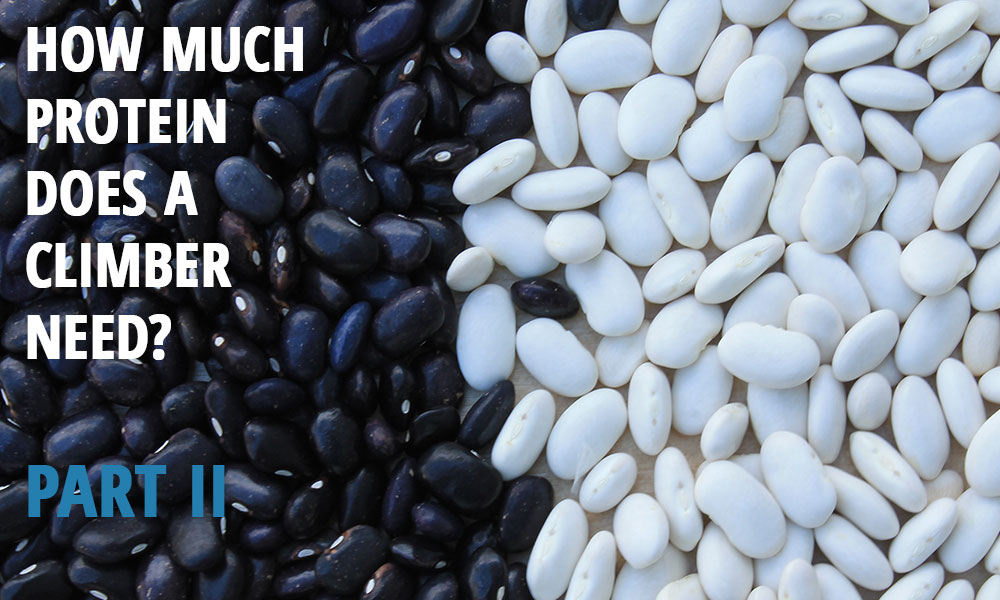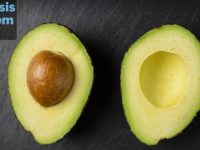In Part I of this series of articles about climbers and their protein needs, I described a new model for determining how much protein you need, a model that doesn’t rely on your bodyweight, sex, or chosen sport:
Aim to get about 120 grams of protein per day. Divide that 120 grams into six meals of at least 20 grams of high-quality protein, and seperate those meal out by around three hours.
If you haven’t already, I highly recommend read Part I as it covers the bulk of why this “20 every 3” model works. It’ll also make the rest of this series of articles on protein easier to understand, as I’ll address the potential caveats, nitpicky details, and misunderstandings that it may spur. So go back and read it (it’s not too long) before continuing!
Done? Good. Now we’ll be on the same page as we continue.
I really want to go into some of the deeper logic behind this recommendation, but I have a feeling that most people will have a few hesitations that I should address first. So in this article, I’m going to address all the misunderstandings or misperceptions about protein and protein needs in climbers that I can think of.
Here it goes…
Misunderstanding #1: Do I Really Want to Maximize Muscle Protein Synthesis?
You may have noticed that whenever I make a recommendation about protein, I’m basing it off a single measurable end-point: muscle protein synthesis. My goal for you in regards to protein is to bring muscle protein synthesis—essentially the creation of new muscle—as close to 100% of its total potential as possible. But, maybe you question that goals. Perhaps the very concept of “maximizing muscle protein synthesis” brings to mind bulky meatheads who are very clearly at a weight disadvantage for climbing. Let me correct this notion.
To begin with, your muscles will only ever adapt to the training you subject them to. Normal people don’t accidentally become “bulky meatheads” because they eat a lot of protein (were it only so simple)—they become this way because they train in large volumes and in very specific ways. I assume that you, as a climber, do not train in the same way.
You should think of your training as a blueprint and of protein as the raw building materials used to construct it. Sure, you can limit the flow of building materials and slow down the entire process—but why would you want to? Your muscles are only attempting to adapt to the type and volume of training you’ve done, and any attempt to forestall muscle growth is a limitation on that adapatation. If you’re really against the idea of training adapations in all their glory, or against any muscle growth at all, then you’re much better off changing your training routine because it will have the same result but save you time.
Climbers who train specifically for climbing will only develop their muscles in ways that specifically support their goals. At its greatest potential, this will involve normal amounts of muscle growth. Yes, you will gain nominal amounts of weight, but it will also vastly increase your strength-to-weight ratio—which is, after all, why your muscles hypertrophy in the first place.
Furthermore, by attempting to limit muscle growth by limiting protein, you also limit the adaptive potential of your connective tissue. All your connective tissues are made of protein as well, and they are subject to hypertrophy (albeit in far lesser amounts) in response to training; thicker cords have greater tensile strength and protect you against injury. Tendon protein synthesis is coordinated with muscle protein synthesis, so limiting protein in an effort to limit muscle growth will also limit tendon growth. Obviously, this is not a desirable goal
So don’t limit your protein intake out of a fear of getting bulky. Maximizing muscle protein synthesis is exactly what you want because “maximizing muscle protein synthesis” is code for “getting the most out of your training”, and that’s something everybody wants regardless of their chosen sport.
Misunderstanding #2: Do I Really Need So Much Protein to Support My Muscles?
Beyond questioning whether climbers really want muscle hypertrophy, I’ve also heard numerous climbers question whether their protein needs are really as high as other athletes. To be honest, I’m not 100% certain where this misperception comes from, except that some climbers appear to believe their forearms are the only muscles they’re working to any great extent and that lesser amounts of protein are therefore needed to repair and build those small muscles.
Let’s address this misunderstanding from a few angles.
To begin with, it’s important to realize that maximizing muscle protein synthesis is not an “energy-balance”-type equation, but more of a threshold response where different total intakes trigger different amounts of muscle protein synthesis. For the most part, the 20 grams of protein per meal that I recommend will not actually be folded into new muscle; if it was, then we’d expect anybody training well to gain around two pounds of pure muscle a week. What the 20 grams does do is maximally trigger metabolic pathways that lead to muscle growth. So while a larger muscle group will probably use more of the protein you’ve supplied, it takes the exact same amount of protein to maximally trigger the event—whether you worked just the forearms or the entire body.
We should also keep in mind that climbing is a full-body sport that involves numerous major muscle groups. Even if we completely ignore the contributions of the leg and chest muscles, the combined mass from our arms, core, and posterior trunk (upper back) still exceeds 45% of our total muscle mass. The forearms may be the first muscle to fail during a typical climb, but muscles across the whole of the body are worked to greater or lesser extents, and they will all respond to optimal amounts of dietary protein.
Thus, it doesn’t matter that climbers use a lot of small muscle groups—protein is a trigger, and it always takes the same amount of pressure to pull it whether you’re aiming at a major muscle group or just a single forearm flexor. If you limit protein because you think your needs are lesser, you significantly impede the development of these minor muscles.
Misunderstanding #3: Is This Really That Important?
Maybe this isn’t really a misunderstanding so much as a differing set of priorities. As I’ve stated before, nobody (including me) is going to make you change your dietary habits, and nobody (including me) should really care so long as you’re happy with the way you eat and the long-term results your diet nets you. The question “Is this really that important?” is not necessarily going to be the same for everyone, therefore. For many of you, it probably isn’t that important.
But for others, getting the most out of their training is a priority. Regardless of how you count the cost of training, whether on money spent for personal coaching, or time spent at the gym, or some other way I haven’t thought of, there is clearly a lot more investment going on there than there is for sports nutrition. Even if you pay someone like me to give you advice, it’s no more than a few hundred dollars and an hour of your time. After that, it’s just the relatively small amount of extra time and money that goes into buying, making, and eating food—and most people enjoy it more than training, too.
I wish I could give a definitive answer as to exactly how important adhering to my recommended protein schedule is, but unfortunately I cannot. All I can say is that for people who are looking to get the very most out of their training, this protein schedule is as significant as any of their other lifestyle modifications, and significantly easier to follow. You can go for 100% effort or you can go for some lesser level and the only real change will be how much you get out of your training, and it’ll be proportional to how much less you do. If you do three meals, you’re basically doing nothing more than what any American already does. If you do five meals, you’ll probably get most of the benefit, but perhaps not all. In the end, it’s really up to you.
I will say that if you are training more than 15 hours a week with the goal of increasing your strength and performance, then you should really be paying attention to your protein intake—there’s no reason not to be, and the benefits are enormous. Furthermore, if you are training at this volume, you are going to seriously hinder your progress if you don’t pay attention to how you’re feeding your muscles. So in short, the more you train and the more seriously you train, the more concern you should have for protein intake (and good sports nutrition in general).
Misunderstanding #4: Is This All There Is to It?
Also not really a misunderstanding, but perhaps it could be in some ways. These articles are on protein, and the way I’m talking about protein you might think it’s the answer to everything! It’s not—it’s just what we’re focused on right now.
There is a lot more that goes into good sports nutrition, including maximizing muscle growth and training adaptation. Protein is a major part of it to be sure, but I’d be remiss if I didn’t say that you need the help of carbohydrates and fats, too, if you really want to perform your best. We’ll cover these other macronutrients (energy-containing nutrients) in later posts, because right now they’re just going to muck things up until everything is too confusing to understand.
So no, protein is not the end-all; it’s just a singular important nutrient. If you continue reading through the coming months and years, you’ll learn plenty more about the other things that comprise good sports nutrition, and you’ll probably come to love how comparatively simple my protein recommendation is.
Next Time on “How Much Protein Does a Climber Need?”…
Two parts done, at least one more to go—maybe more, we’ll see when I finish the next one.
Now that I’ve (hopefully) resolved any worries you have about protein, it’ll be time to delve deeper into the recommendation itself and explore why the logic behind it works as well as where it might breakdown.
See you then.














